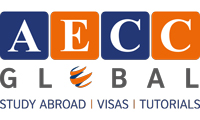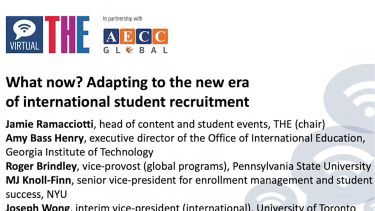Industry leaders discuss the issues facing the Australian higher education sector, and what practical measures could be taken to boost its international student intake
With Australian borders closed to contain the spread of Covid-19, the country’s higher education sector faces a crisis. How can Australian universities remain internationally competitive when much of their cohort is unable to return to campus to continue their studies?
This is a unique time for universities worldwide, but stringent public health measures have left Australian institutions facing a particularly testing time. At a Times Higher Education webinar, in partnership with AECC Global, a panel of industry leaders from Australia and New Zealand discussed the challenges of student recruitment. They addressed the present political climate, in which 70 per cent of Australians support border closures that have seen many international students stranded in their home countries.
Phil Honeywood, chief executive officer of the International Education Association of Australia, voiced concern that Australia would squander its “health dividend” if international students could not return. Thus far, travel exemptions have only been granted to around 1,000 fourth-year medical and dental students.
The situation is particularly difficult for students in the final year of their studies. Jodie Altan, director of global student recruitment at RMIT University, feared lasting damage to the sector’s international reputation. “We have got a lot of students offshore who may be near completion of their programmes,” she said. “They are just waiting to be onshore and in a circumstance where they can come in and complete. I am very keen to see us fulfil our promise to those students. It is in our interest to see these students succeed.”
Altan said the past year had proved higher education’s capability to adapt. While there has been a wholesale shift to online teaching, it is important to maintain quality face-to-face teaching experiences. Partnerships with institutions across South-east Asia and beyond are increasingly important for Australian universities. Institutions such as RMIT are well placed, with two campuses in Vietnam and many partnerships in the region. Now is the time to leverage them, said Altan.
Claire Field, principal of consultancy firm Claire Field & Associates, believes it is vital that institutions invest in online learning. Online teaching needs to be “really high quality, not Zoom classrooms”, she said. The panel agreed that the higher education sector must continue to highlight the importance of Australia’s international students and the benefits they bring to the economy. International students create jobs and opportunities, and policymakers need to show political courage in supporting them.
Jonathan Chew, head of strategic insights and analytics at Navitas, hoped that the potential success of mass vaccination programmes in the US and the UK might set an example for Australia. “Competition to return to normal will be a driver for change,” he said. “Fingers crossed there is some fear of missing out in Australia as we see other countries start to return to normal.”
Altan said international students are looking for more than just qualifications; they want an experience in the country they study in. For many, the chance to enhance their English-language skills while working in Australia is a huge motivating factor in their decision to study in the country, and higher education needs to be more entrepreneurial to attract them.
Honeywood said Australia should look to the UK in providing post-study work visas to attract students. Student quality is key, said Chew. The sector needs to look beyond the temptation to sugar-rush next year’s enrolment figures with reduced fees, and to build strategic partnerships and sustainable channels. New markets are crucial, and the sector must continue to lobby for better migration outcomes and maintain excellence in teaching that will convince students to choose Australia.
Find out more about AECC Global.
Watch the Times Higher Education and AECC Global webinar on-demand above or on the THE Connect YouTube channel.



